- Home
- Connie Willis
The Doomsday Book Page 19
The Doomsday Book Read online
Page 19
The fifteenth of December means it’s Christmas Eve there, and you’ll be giving your sherry party and then walking over to St. Mary the Virgin’s for the interchurch service. It is hard to comprehend that you are over seven hundred years away. I keep thinking that if I got out of bed (which I can’t because I’m too dizzy—I think my temp is back up) and opened the door I would find not a mediaeval hall but Brasenose’s lab, and all of you waiting for me, Badri and Dr. Ahrens and you, Mr. Dunworthy, polishing your spectacles and saying I told you so. I wish you were.
12
Lady Imeyne did not believe Kivrin’s story about having amnesia. When Agnes brought her hound, which turned out to be a tiny black puppy with huge feet, in to Kivrin, she said, “This is my hound, Lady Kivrin.” She held it out to Kivrin, clutching its fat middle. “You can pet him. Do you remember how?”
“Yes,” Kivrin said, taking the puppy out of Agnes’s too-tight grasp and stroking its baby-soft fur. “Aren’t you supposed to be at your sewing?”
Agnes took the puppy back from her. “Grandmother went to chide with the steward, and Maisry went out to the stable.” She twisted the puppy around to give it a kiss. “So I came to speak to you. Grandmother is very angry. The steward and all his family were living in the hall when we came hence.” She gave the puppy another kiss. “Grandmother says it is his wife who tempts him to sin.”
Grandmother. Agnes had not said anything like “grandmother.” The word hadn’t even existed until the eighteenth century, but the interpreter was taking huge, disconcerting leaps now, though it left Agnes’s mispronunciation of Katherine intact and sometimes left blanks in places where the meaning should have been obvious from context. She hoped her subconscious knew what it was doing.
“Are you a daltriss, Lady Kivrin?” Agnes said.
Her subconscious obviously didn’t know what it was doing. “What?” she asked.
“A daltriss” Agnes said. The puppy was trying desperately to squirm out of Agnes’s grip. “Grandmother says you are one. She says a wife fleeing to her lover would have good cause to remember naught.”
An adultress. Well, at least it was better than a French spy. Or perhaps Lady Imeyne thought she was both.
Agnes kissed the puppy again. “Grandmother said a lady had no good cause to travel through the woods in winter.”
Lady Imeyne was right, Kivrin thought, and so was Mr. Dunworthy. She still had not found out where the drop was, although she had asked to speak with Gawyn when Lady Eliwys came in the morning to bathe her temple.
“He has ridden out to search for the wicked men who robbed you,” Eliwys had said, putting an ointment on Kivrin’s temple that smelled like garlic and stung horribly. “Do you remember aught of them?”
Kivrin had shaken her head, hoping her faked amnesia wouldn’t end in some poor peasant’s being hanged. She could scarcely say, “No, that isn’t the man,” when she supposedly couldn’t remember anything.
Perhaps she shouldn’t have told them she couldn’t remember anything. The probability that they would have known the de Beauvriers was very small, and her lack of an explanation had obviously made Imeyne even more suspicious of her.
Agnes was trying to put her cap on the puppy. “There are wolves in the woods,” she said. “Gawyn slew one with his ax.”
“Agnes, did Gawyn tell you of his finding me?” Kivrin asked.
“Aye. Blackie likes to wear my cap,” she said, tying the strings in a choking knot.
“He doesn’t act like it,” Kivrin said. “Where did Gawyn find me?”
“In the woods,” Agnes said. The puppy twisted out of the cap and nearly fell off the bed. She set it in the middle of the bed and lifted it by its front paws. “Blackie can dance.”
“Here. Let me hold it,” Kivrin said, to rescue the poor thing. She cradled it in her arms. “Where in the woods did Gawyn find me?”
Agnes stood on tiptoe, trying to see the puppy. “Blackie sleeps,” she whispered.
The puppy was asleep, exhausted from Agnes’s attentions. Kivrin laid it beside her on the fur bed covering. “Was the place he found me far from here?”
“Aye,” Agnes said, and Kivrin could tell she had no idea.
This was no use. Agnes obviously didn’t know anything. She would have to talk to Gawyn. “Has Gawyn returned?”
“Aye,” Agnes said, stroking the sleeping puppy. “Would you speak with him?”
“Yes,” Kivrin said.
“Are you a daltriss?”
It was difficult to follow Agnes’s conversational jumps. “No,” she said, and then remembered she was not supposed to be able to remember anything. “I don’t remember anything about who I am.”
Agnes petted Blackie. “Grandmother says only a daltriss would ask so boldly to speak with Gawyn.”
The door opened, and Rosemund came in. “They’re looking for you everywhere, simplehead,” she said, her hands on her hips.
“I was speaking with Lady Kivrin,” Agnes said with an anxious glance at the coverlid where Blackie lay, nearly invisible against the sable fur. Apparently hounds were not allowed inside. Kivrin pulled the rough sheet up over it so Rosemund wouldn’t see.
“Mother said the lady must rest so that her wounds will heal,” Rosemund said sternly. “Come. I must tell Grandmother I found you.” She led the little girl out of the room.
Kivrin watched them leave, hoping fervently that Agnes wouldn’t tell Lady Imeyne Kivrin had asked again to speak to Gawyn. She had thought she had a good excuse to talk to Gawyn, that they would understand that she was anxious to find out about her belongings and her attackers. But it was “unseemly” for unmarried noblewomen in the 1300s to “boldly ask” to speak to young men.
Eliwys could talk to him because she was the head of the house with her husband gone, and his employer, and Lady Imeyne was his lord’s mother, but Kivrin should have waited until Gawyn spoke to her and then answered him “with all modesty as fits a maid.” But I must talk to him, she thought. He’s the only one who knows where the drop is.
Agnes came dashing back in and snatched up the sleeping puppy. “Grandmother was very angry. She thought I had fallen in the well,” Agnes said, and ran back out again.
And no doubt “Grandmother” had boxed Maisry’s ears because of it, Kivrin thought. Maisry had already been in trouble once today for losing Agnes, who had come to show Kivrin Lady Imeyne’s silver chain, which she said was “a rillieclary,” a word that defeated the interpreter. Inside the little box, she told Kivrin, was a piece of the shroud of St. Stephen. Maisry had had her pocked cheek slapped by Imeyne for letting Agnes take the reliquary and for not watching her, though not for letting the little girl in the sickroom.
None of them seemed concerned at all about the little girls getting close to Kivrin or to be aware that they might catch what she had. Neither Eliwys nor Imeyne took any precautions in caring for her.
The contemps hadn’t understood the mechanics of disease transmission, of course—they believed it was a consequence of sin and epidemics were a punishment from God—but they had known about contagion. The motto of the Black Death had been “Depart quickly, go far, tarry long,” and there had been quarantines before that.
Not here, Kivrin thought, and what if the little girls come down with this? Or Father Roche?
He had been near her all through her fever, touching her, asking her name. She frowned, trying to remember that night. She had fallen off the horse, and then there was a fire. No, she had imagined that in her delirium. And the white horse. Gawyn’s horse was black.
They had ridden through a wood and down a hill past a church, and the cutthroat had—It was no use. The night was a shapeless dream of frightening faces and bells and flames. Even the drop was hazy, unclear. There had been an oak tree and willows, and she had sat down against the wagon wheel because she felt so dizzy, and the cutthroat had—No, she had imagined the cutthroat. And the white horse. Perhaps she had imagined the church as well.
She
would have to ask Gawyn where the drop was, but not in front of Lady Imeyne, who thought she was a daltriss. She had to get well, to get enough strength to get out of bed and go down to the hall, out to the stable, to find Gawyn to speak to him alone. She had to get better.
She was a little stronger, though she was still too weak to walk to the chamber pot unaided. The dizziness was gone, and the fever, but her shortness of breath persisted. They apparently thought she was improving, too. They had left her alone most of the morning, and Eliwys had only stayed long enough to smear on the foul-smelling ointment. And have me make improper advances toward Gawyn, Kivrin thought.
Kivrin tried not to worry about what Agnes had told her or why the antivirals hadn’t worked or how far the drop was, and to concentrate on getting her strength back. No one came in all afternoon, and she practiced sitting up and putting her feet over the side of the bed. When Maisry came with a rushlight to help her to the chamber pot, she was able to walk back to the bed by herself.
It grew colder in the night, and when Agnes came to see her in the morning, she was wearing a red cloak and hood of very thick wool and white fur mittens. “Do you wish to see my silver buckle? Sir Bloet gave it me. I will bring it on the morrow. I cannot come today, for we go to cut the Yule log.”
“The Yule log?” Kivrin said, alarmed. The ceremonial log had traditionally been cut on the twenty-fourth, and this was only supposed to be the seventeenth. Had she misunderstood Lady Imeyne?
“Aye,” Agnes said. “At home we do not go till Christmas Eve, but it is like to storm, and Grandmother would have us ride out to fetch it while it is yet fine weather.”
Like to storm, Kivrin thought. How would she recognize the drop if it snowed? The wagon and her boxes were still there, but if it snowed more than a few inches she would never recognize the road.
“Does everyone go to fetch the Yule log?” Kivrin asked.
“Nay. Father Roche called Mother to tend a sick cottar.”
That explained why Imeyne was playing the tyrant, bullying Maisry and the steward and accusing Kivrin of adultery. “Does your grandmother go with you?”
“Aye,” she said. “I will ride my pony.”
“Does Rosemund go?”
“Aye.”
“And the steward?”
“Aye,” she said impatiently. “All the village goes.”
“Does Gawyn?”
“Nay,” she said, as if that were self-evident. “I must go out to the stable and bid Blackie farewell.” She ran off.
Lady Imeyne was going, and the steward, and Lady Eliwys was somewhere nursing a peasant who was ill. And Gawyn, for some reason that was obvious to Agnes but not to her, wasn’t. Perhaps he had gone with Eliwys. But if he hadn’t, if he were staying here to guard the manor, she could talk to him alone.
Maisry was obviously going. When she brought Kivrin’s breakfast she was wearing a rough brown poncho and had ragged strips of cloth wrapped around her legs. She helped Kivrin to the chamber pot, carried it out, and brought up a brazier full of hot coals, moving with more speed and initiative than Kivrin had seen before.
Kivrin waited an hour after Maisry left, until she was sure they were all gone, and then got out of bed and walked to the window seat and pulled the linen back. She could not see anything except branches and dark gray sky, but the air was even colder than that in the room. She climbed up on the window seat.
She was above the courtyard. It was empty, and the large wooden gate stood open. The stones of the courtyard and of the low thatched roofs around it looked wet. She stuck her hand out, afraid it had already begun to snow, but she couldn’t feel any moisture. She climbed down, holding on to the ice-cold stones, and huddled by the brazier.
It gave off almost no heat. Kivrin hugged her arms to her chest, shivering in her thin shift. She wondered what they had done with her clothes. Clothes were hung on poles beside the bed in the Middle Ages, but this room had no poles, and no hooks either.
Her clothes were in the chest at the foot of the bed, neatly folded. She took them out, grateful that her boots were still there, and then sat on the closed lid of the chest for a long time, trying to catch her breath.
I have to speak to Gawyn this morning, she thought, willing her body to be strong enough. It’s the only time everyone will be gone. And it’s going to snow.
She dressed, sitting down as much as possible and leaning against the bedposts to pull her hose and boots on, and then went back over to the bed. I’ll rest a little, she thought, just till I’m warmed through, and was immediately asleep.
The bell woke her, the one from the southwest she had heard when she came through. It had rung all yesterday and then stopped, and Eliwys had gone over to the window and stood there for a while, as if trying to see what had happened. The light from the window was dimmer, but it was only that the clouds were thicker, lower. Kivrin put on her cloak and opened the door. The stairs were steep, set into the stone side of the hall, and had no railing. Agnes was lucky she had only skinned her knee. She might have pitched headlong onto the floor below. Kivrin kept her hand on the wall and rested halfway, looking at the hall.
I’m really here, she thought. It really is 1320. The hearth in the middle of the room glowed a dull red with the banked coals, and there was a little light from the smoke hole above it and the high, narrow windows, but most of the hall was in shadow.
She stopped where she was, peering into the smoky gloom, trying to see if anyone was there. The high seat, with its carved back and arms, sat against the end wall with Lady Eliwys’s slightly lower, slightly less ornate one next to it. There were tapestries on the wall behind them and a ladder at the far end of the wall up to what must be a loft. Heavy wooden tables hung along the other walls above the wide benches, and a narrower bench sat next to the wall just below the stairs. The beggar’s bench. And the wall it sat against was the screens.
Kivrin came down the rest of the stairs and tiptoed across to the screens, her feet crunching loudly on the dried rushes scattered on the floor. The screens were really a partition, an inside wall that shut off the draft from the door.
Sometimes the screens formed a separate room, with box beds in either end, but behind these there was only a narrow passage, with the missing hooks for hanging up cloaks. There were no cloaks there now. Good, Kivrin thought, they’re all gone.
The door was open. On the floor next to it was a pair of shaggy boots, a wooden bucket, and Agnes’s cart. Kivrin stopped in the little anteroom to catch her already ragged breath, wishing she could sit down a moment, and then looked carefully out the door and went outside.
There was no one in the enclosed courtyard. It was cobbled with flattish yellow stones, but the center of it, where a water trough hollowed out of a tree stood, was deep in mud. There were trampled hoofprints and footprints all around it, and several puddles of brown water. A thin, mangy-looking chicken was drinking fearlessly from one of the pools. Chickens had only been raised for their eggs. Pigeons and doves had been the chief meat fowls in the 1300s.
And there was the dovecote by the gate, and the thatch-roofed building next to it must be the kitchen, and the other, smaller buildings the storehouses. The stable, with its wide doors, stood along the other side, and then a narrow passage, and then the big stone barn.
She tried the stable first. Agnes’s puppy came bounding out to meet her on its clumsy feet, yipping happily, and she had to hastily push it back inside and shut the heavy wooden door. Gawyn obviously wasn’t in there. He wasn’t in the barn either, or in the kitchen or in the other buildings, the largest of which turned out to be the brewhouse. Agnes had said he wasn’t going with the procession to cut the Yule log as if it were something obvious, and Kivrin had assumed he had to stay here to guard the manor, but now she wondered if he had gone with Eliwys to visit the cottar.
If he has, she thought, I’ll have to go find the drop myself. She started toward the stable again, but halfway there she stopped. She would never be able to get u
p on a horse by herself, feeling as weak as she did, and if she did somehow manage it, she was too dizzy to stay on. And too dizzy to go looking for the drop. But I have to, she thought. They’re all gone, and it’s going to snow.
She looked toward the gate and then the passage between the barn and the stable, wondering which way to go. They had come down a hill, past a church. She remembered hearing the bell. She didn’t remember the gate or the courtyard, but that was most likely the way they had come.
She walked across the cobbles, sending the chicken clucking frantically over to the shelter of the well, and looked out the gate at the road. It crossed a narrow stream with a log bridge and wound off to the south into the trees. But there wasn’t any hill, and no church, no village, no indication that that was the way to the drop.
There had to be a church. She had heard the bell, lying in bed. She walked back into the courtyard and across to the muddy path. It led past a round wattle pen with two dirty pigs in it, and the privy, unmistakable in its smell, and Kivrin was afraid that the path was only the way to the outhouse, but it wound around behind the privy and opened out onto a green.
And there was the village. And the church, sitting at the far end of the green just the way Kivrin remembered it, and beyond it was the hill they had come down.
The green didn’t look like a green. It was a ragged open space with huts on one side and the willow-edged stream on the other, but there was a cow grazing on what was left of the grass and a goat tethered to a big leafless oak. The huts straggled along the near side between piles of hay and muck heaps, getting smaller and more shapeless the farther they were from the manor house, but even the one closest to the manor house, which should be the steward’s, was nothing but a hovel. It was all smaller and dirtier and more tumbledown than the illustrations in the history vids. Only the church looked the way it was supposed to.
The bell tower stood separate from it, between the churchyard and the green. It had obviously been built later than the church with its Norman round-arched windows and grayed stone. The tower was tall and round, and its stone was yellower, almost golden.

 Passage
Passage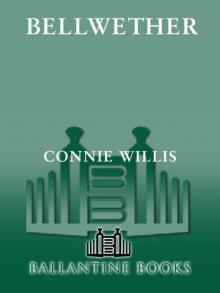 Bellwether
Bellwether Blackout
Blackout Doomsday Book
Doomsday Book A Lot Like Christmas: Stories
A Lot Like Christmas: Stories Water Witch
Water Witch To Say Nothing of the Dog
To Say Nothing of the Dog Fire Watch
Fire Watch The Winds of Marble Arch and Other Stories
The Winds of Marble Arch and Other Stories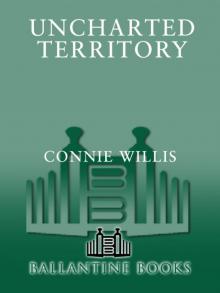 Uncharted Territory
Uncharted Territory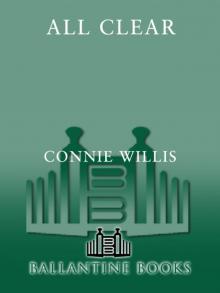 All Clear
All Clear Crosstalk
Crosstalk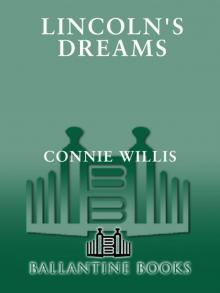 Lincoln's Dreams
Lincoln's Dreams Miracle and Other Christmas Stories
Miracle and Other Christmas Stories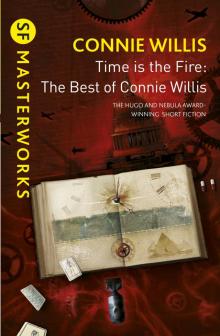 Time is the Fire
Time is the Fire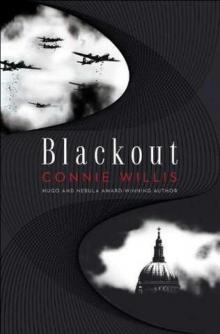 Blackout ac-1
Blackout ac-1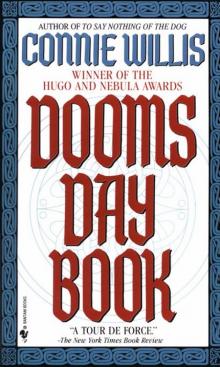 Dooms Day Book
Dooms Day Book Jack
Jack The Doomsday Book
The Doomsday Book Terra Incognita
Terra Incognita The Best of Connie Willis
The Best of Connie Willis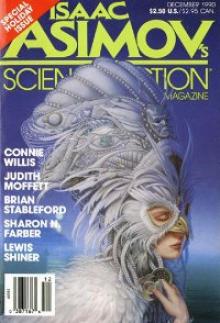 Cibola
Cibola Schwarzschild Radius
Schwarzschild Radius Even the Queen
Even the Queen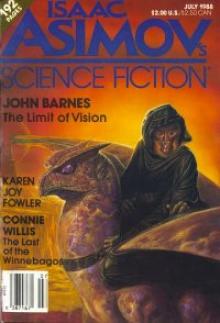 The Last of the Winnebagos
The Last of the Winnebagos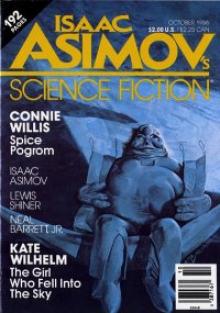 Spice Pogrom
Spice Pogrom Oxford Time Travel 1 - Blackout
Oxford Time Travel 1 - Blackout At The Rialto
At The Rialto A Lot Like Christmas
A Lot Like Christmas